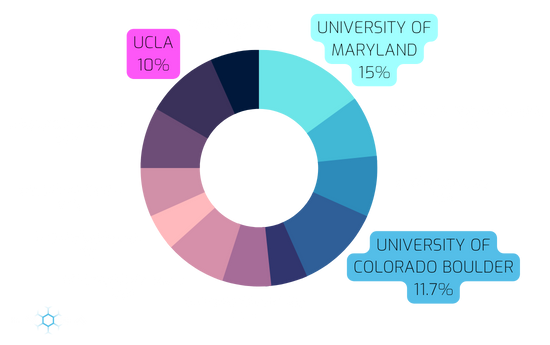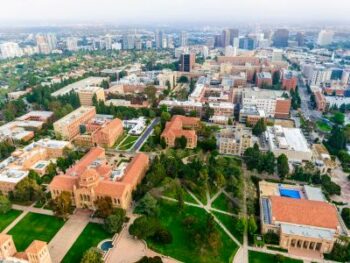The Top Universities for SATCOM Studies
The Satellite Communications (SATCOM) sector is witnessing a remarkable surge in growth, fueled by groundbreaking advancements in technology and the emergence of private space companies.

This dynamic landscape is creating a wealth of opportunities, continually redefining and revitalizing this forward-thinking field. For those drawn to the allure of space exploration, the complexities of satellite communication, and the thrill of revolutionary technology, a career in the SATCOM industry might be a perfect fit.
Education serves as the springboard for a successful career in this rapidly evolving industry. Maintaining a competitive edge in SATCOM requires a keen eye on current trends, an ear to the ground for emerging talent, and an ability to adapt. For employers, identifying which universities are churning out the brightest minds in SATCOM offers a strategic advantage during recruitment processes. For students and those at the onset of their career, selecting the right university is a critical first step towards carving a successful career path in SATCOM.
EVONA recognizes the crucial role that education plays in crafting the future of SATCOM. With the industry’s rapid expansion, the need for highly educated, forward-thinking individuals in SATCOM is at an all-time high.
By analyzing employment data from leading SATCOM companies, we’ve identified a select group of universities that consistently produce the industry’s top talent. Interestingly, 90% of graduates landing jobs in the SATCOM sector graduate from American universities, with the University of Maryland leading the charge.
Top 10 Universities for SATCOM Studies by Industry Hires
 University of Maryland, US
University of Maryland, US - University of Colorado Boulder, US
- University of California (UCLA), US
- Stanford University, US
- University of Southern California, US
- University of Washington, US
- Arizona State University, US
- George Mason University, US
- University of Phoenix, US
- Tel Aviv University, Israel
When it comes to the world of SATCOM, the US stands as a dynamic hub of innovation, forging ahead with remarkable advancements in space exploration and technology.
The US: A Global Hub for SATCOM Education

The US has earned a global reputation as a leading hub for SATCOM education, a reputation that has been forged through its vigorous space programs, innovative research environments, and an influential network of world-leading institutions.
The Universities Space Research Association (USRA) lies at the heart of this educational framework. As a vital link, USRA connects universities, government bodies, and a wide spectrum of other organizations. By offering an expansive array of resources, driving research opportunities, and delivering expert technical insights, USRA fuels a collaborative atmosphere that nurtures innovation and growth. Its steadfast commitment to high-quality standards elevates the industry relevance of its member universities’ research, establishing a gold standard within the sector.
Also central to the US’s prominence in SATCOM education is the relationship between NASA and leading American universities. This partnership, enabled by regular funding for space exploration initiatives, creates a robust foundation for the sector’s development. NASA’s commitment to fostering academic programs focused on space-related studies accelerates progress in the SATCOM industry, effectively preparing students to navigate the constantly evolving opportunities and challenges within the field.
Tel Aviv: A Global Hub for SATCOM Education
While the United States dominates the SATCOM landscape, there are notable universities outside the US that excel in providing world-leading education in satellite communications. Situated in Israel, Tel Aviv University has distinguished itself as an international center for SATCOM education, drawing in students and researchers from across the globe.
With strong industry ties, research collaborations, and cutting-edge facilities, Tel Aviv attracts students and researchers worldwide. Its strategic location in Israel’s thriving tech ecosystem offers abundant opportunities for internships, collaborations, and networking with satellite communication companies and start-ups. The Department of Electrical Engineering, led by esteemed faculty, also provides rigorous programs covering wireless communications, signal processing, and satellite systems. Tel Aviv University fosters innovation and entrepreneurship, encouraging students to pursue groundbreaking ideas and contribute to SATCOM industry growth.
The Top Three Universities for SATCOM Studies
University of Maryland
 Location: Baltimore, Maryland
Location: Baltimore, Maryland- Gender Split: 51% male, 49% female
- Total Enrollment: Approx 41,200 students
- USRA Membership: Yes
- Funding: NASA allocated $32.5 million to extend its partnership with the University of Maryland, enabling continued management of data on small celestial objects—a field significantly advanced by UMD’s research
- World Ranking for Space Science: 24th
- Notable Collaborations: Partnerships with NASA’s Goddard Space Flight Center and the Joint Space-Science Institute (JSI)
- Key Departments: Department of Astronomy, Department of Aerospace Engineering, and Maryland Robotics Center
- Relevant Courses: Offerings include spacecraft systems and design, wireless communications, signal processing, space robotics, and spacecraft autonomy
- Geographic Benefits: Proximity to Washington, D.C. offers numerous internship and employment opportunities with government agencies and private companies. Close ties with NASA’s Goddard Space Flight Center provide unique opportunities for research and learning.
University of Colorado, Boulder
 Location: Boulder, Colorado
Location: Boulder, Colorado- Gender Split: 55% male, 45% female
- Total Enrollment: Approx 37,000 students
- USRA Membership: Yes
- Funding: Top university recipient of NASA research awards
- Notable Collaborations: Partnerships with NASA, National Oceanic and Atmospheric Administration (NOAA), and National Institute of Standards and Technology (NIST)
- Key Departments: Ann and H.J. Smead Department of Aerospace Engineering Sciences, Laboratory for Atmospheric and Space Physics, BioServe Space Technologies Center, Department of Electrical, Computer, and Energy Engineering
- Relevant Courses: Course offerings include space and satellite systems, wireless communications, signal processing, and control systems
- Geographic Benefits: In the heart of the American aerospace industry, students benefit from a rich network of space research organizations and companies. Boulder also offers an excellent quality of life, fostering a positive learning environment.
University of California, Los Angeles (UCLA)
 Location: Los Angeles, California
Location: Los Angeles, California- Gender Split: 40% male, 60% female
- Total Enrollment: Approx 44,000 students
- USRA Membership: Yes
- Funding: Ranked as a top public university for securing federal funding, including for space-related research and SATCOMs
- Notable Collaborations: Collaborative partnerships with NASA, NOAA, and Jet Propulsion Laboratory (JPL)
- Space Missions: UCLA has participated in over 50 space missions
- Key Departments: Department of Physics and Astronomy, Department of Electrical and Computer Engineering, Institute of Geophysics and Planetary Physics, UCLA’s Galactic Center Group
- Relevant Courses: UCLA offers courses in astrophysics, space physics, signal processing, network communications, and wireless technologies.
- Geographic Benefits: Located in the global hub of technology and entertainment, students enjoy access to a diverse range of industries. Proximity to companies in the Silicon Valley and renowned institutions like JPL offer excellent internship and job opportunities.
The influential role these leading universities play in shaping the SATCOM industry’s future is undeniable. They provide the knowledge, exposure, and hands-on experience necessary for the next generation of professionals to lead and innovate in this rapidly evolving field. For those aspiring to build a career in SATCOM, these institutions stand as a beacon, offering a combination of world-class education, research opportunities, and strong industry ties.
As the SATCOM landscape continues to expand and redefine itself, the question for prospective students and professionals is: how will you leverage these opportunities to forge your unique path in the industry?
Whether you’re an employer in search of top-notch talent, a student figuring out your academic trajectory, or a professional considering the next steps in your career, we’re here to give you guidance and advice. Your SATCOM journey starts with a conversation, so let’s talk.
READ MORE
-
India Successfully Lands Spacecraft on Moon’s South Pole
India achieves a historic milestone by successfully landing Chandrayaan-3 spacecraft on the moon's south pole, marking the nation's ascent to lunar exploration. Learn about the significance of this achievement and its implications for space exploration.Read More -
The Top Universities for SATCOM Studies
Discover the thriving world of SATCOM education and career opportunities. Explore top universities shaping the industry and gain expert advice for employers and candidates navigating the dynamic field of satellite communications.Read More -
Timber in Orbit: Japan’s Wooden Satellite Prepares for Launch
In a groundbreaking endeavor, Japanese researchers are challenging conventions by showcasing the unexpected resilience of wood in the hostile environment of outer space. This extraordinary feat raises an intriguing question: could wooden satellites hold the key to a sustainable future for space technology?Read More